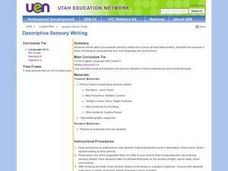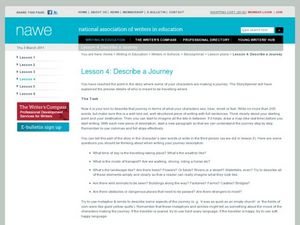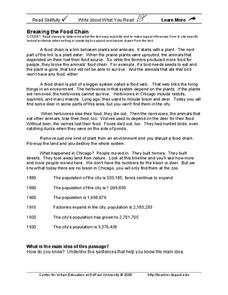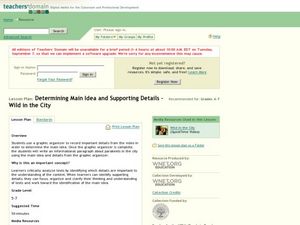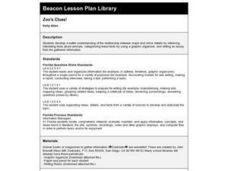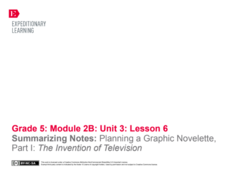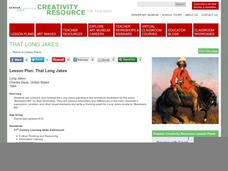Curated OER
What's The Idea?
Quite often, learners confuse the main idea in a selection of reading with the supporting details. In this activity, pupils practice the skill of finding the main idea and the supporting details in pieces of writing. Newspaper articles...
Curated OER
Descriptive Prompt: Precise Language
Incorporate sensory details into a piece of descriptive writing. First, elementary and middle schoolers improve a piece of writing by using precise, vivid language, as well as appropriate word choice. They then listen to a variety of...
Curated OER
Lesson Plan 12: Writing With All Your Senses
What does an ice cream sundae sound like? Challenge young writers to move beyond visual descriptions and craft details that appeal to all five senses. The examples provided by the script in this resource show pupils how to create rich...
DePaul University
Settlement
Early settlers in the American Midwest experienced constant struggle. This reading passage describes for young learners the hardships of homesteaders as they journeyed west and sought to start a new life. When finished, students identify...
Curated OER
Describe a Journey
Students describe the sensory experience of a character's journey in an essay. For this precise details writing lesson, students explain the effects on the senses of weather, time of day, landscape, and other experiences. Students use...
Polk Bros Foundation
Science Learning Summary Guide
Apply reading standards to your science curriculum by asking pupils to complete this guide. Individuals note down important vocabulary as well as two ideas they learned and two supporting facts for each idea. They then take this...
Curated OER
Elaborating the Main Idea, Using Supporting Details
A desk is used as a visual analogy to construct the main idea and supporting details in a story. The top of the desk is the main idea, and each of the four legs provides supporting details. The legs of the desk provide support for the...
DePaul University
Breaking the Food Chain
Throughout history, the growth of big cities has resulted in the destruction of ecosystems. In the case of Chicago, IL, a grassland that was once home to bison, deer, wolves, and foxes quickly became a booming city of over three million...
DePaul University
A Garden in Lawndale
We are all capable of changing the world for the better; all it takes is a spark. Read about a group of seventh grade students in Chicago, IL who took it upon themselves to improve their community by turning a vacant lot into a garden....
DePaul University
The Football Team
Playing team sports is about more than just scoring the most goals or winning the most games. Read this passage with your class and learn how athletes build character as members of a team. When finished, individuals identify the main...
Polk Bros Foundation
How to Summarize an Event in History or Today - or a Story
Ask your class to write a quick summary of a historical or current event. The worksheet offers a place to note down important details about the event, such as time, place, people, how it started, and how it ended. Pupils then take this...
Polk Bros Foundation
How to Summarize a Non-Fiction Passage
After reading a text, one way to find out how much your class comprehended is to ask your pupils to summarize. This worksheet helps class members prepare for writing a summary of a nonfiction text. They note down the topic, up to eight...
Curated OER
Dear Diary
Work on narrative writing with this lesson, in which middle schoolers analyze the characters from a selected piece of literature and write narrative diary pieces as the character. They work to understand the point of view of the...
Curated OER
Borrowing Narrative Skills from Mr. Fletcher: Using a "Prompts in Reverse" Technique to Inspire Your Writers
Help your class find their writing voices with this instructional activity which uses the work of Ralph Fletcher to guide a "Prompt in Reverse" activity. Using the chapter "First Pen" from Fletcher's Marshfield Dreams, learners decipher...
Curated OER
Plain Polly: Adding Relevant Details
Students use a stick figure to help them learn to write with details. In this details lesson plan, students brainstorm details to add to the stick figure 'Plain Polly.' Students then draw stick figures for their own writing and give them...
Curated OER
Details, Details
Students explore statistics by participating in a personal details activity. In this data collection lesson plan, students identify the importance of personal information collection and how it can be used against them if collected...
Curated OER
Determining Main Idea and Supporting Details-Wild in the City
Students discuss the main idea of a story. In this writing process lesson, students use a video about parakeets as a tool to find the main idea of a story. After viewing the video, they engage in a discussion about determining which...
Curated OER
Zoo's Clues!
Students determine the difference between major and minor details after researching animals and completing graphic organizers. They write descriptive paragraphs for classmates to guess what animal is being described.
Curated OER
3R Activity (Reading-Relating-Responding)
Students read for detail. In this reading comprehension lesson, students read a passage and share their thoughts with a small group. Students reflect upon the passage and develop an oral summary of the text.
Nancy Fetzer's Literacy Connections
Expository Paragraph
Upper elementary and middle school writers learn how to craft an expository paragraph by following the six steps detailed in a 48-page instructional guide. Learners learn how to write six different types of informational paragraphs: to...
EngageNY
Summarizing Notes: Planning a Graphic Novelette Part 1: The Invention of Television
What's the story? Learners create the first of four storyboards about the invention of the television, incorporating narrative techniques and descriptive details. Next, they offer and receive feedback by participating in a peer critique...
Curated OER
Lesson: That Long Jakes
Cross-media analysis takes time and attention to detail. The class analyzes the painting Long Jakes and the poem "Backward Bill." They pay attention to the similarities and differences in each piece, looking for details that describe the...
Curated OER
8-Sentence Accordion Paragraph Practice
Organization can take a paragraph from mundane to first-rate. Try out a graphic organizer for an accordion-style paragraph, which includes a topic sentence, three reasons with details and transitions, three explanations, and a concluding...
Curated OER
Mapping Your Identity: A Back-To-School Ice Breaker
Identify the unique personal attributes of your class members. Begin by viewing the Visual Thesaurus and discussing displayed attributes associated with famous American leaders. Using these identity maps as models, pupils generate nouns...
Other popular searches
- Main Idea and Details
- Main Idea Supporting Details
- Sensory Details
- Noting Details
- Supporting Details
- Facts and Details
- Details in Writing
- Main Idea & Supporting Details
- Recall Facts and Details
- Main Ideas Details
- Recalling Facts and Details
- Identifying Supporting Details



